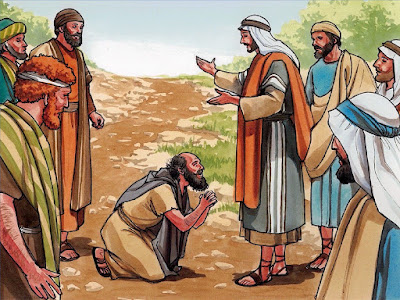The sin of ungratefulness, the worst of all leprosies.
October 13 2019: Twenty-eighth Sunday in Ordinary Time - C
A Native American Minquass proverb says, “If you see no
reason for giving thanks, the fault lies in yourself.” And another proverb
adds, “You can't keep a word of thanks in your pocket.”
There is always a sufficient reason in life to be thankful. Thus,
Paul can exhort, “In all circumstances, give thanks, for this is the will of
God for you in Christ Jesus.” (1 Thes 5:18) The thanksgiving is from far, the
greatest form of prayer we can raise to God. It is an act of faith to give
thanks and it disposes one’s to receive more blessings from God. He who knows
how to be grateful, even for little, receives always more. And in that sense, gratitude becomes
an act or an expression of belongingness to God.
We live in a world where people have tendency of taking
everything for granted. No matter how much sacrifice you undertake for some people,
either they don’t value it or they just get the fruits of your hardship and
move on without saying nothing. People feel it as normal to see you giving
yourself as much as you can for them. It is your duty, and for them, a right to
receive it. Therefore, seldom we express feelings of gratitude and say thanks
in return to those who undertake sacrifice for us.
Today’s liturgy, through the attitude of two lepers
miraculously healed, teaches us the value of gratitude. In the first reading we
hear about Naaman, a Syrian, healed by Elisha. Besides the details and
circumstances of the miraculous healing of that Syrian official, what attracts
more our attention is what Naaman did after. We read that, after following the instructions
of the Man of God to plunge into the Jordan seven times, Naaman’s “flesh became
again like the flesh of a little child, and he was clean of his leprosy.” He
could have just gone his way back to Syria. But instead, Naaman returned to Elisha, loaded with offerings to give thanks to God and to his prophet. Thanksgiving
here takes the meaning of returning to the Lord. And Naaman truly returned to
the Lord, promising to become a worshiper of the God of Israel, “I will no
longer offer holocaust or sacrifice to any other god except to the LORD.”
The Gospel will go in the same sense of thanksgiving. We have
here, another scenario of healing of lepers, ten this time. As St. Luke
reports, ten lepers approached Jesus pleading and praying: “Jesus, Master! Have pity on us!” The Lord heard their
prayers and instructed them on what to do. While on their way, they were all
healed. But then, only one made his way back to praise and give thanks to the
Lord. Jesus failed not to remark it, “Ten were cleansed, were they not? Where
are the other nine? Has none but this
foreigner returned to give thanks to God?” And to this one, his gratitude added
to his physical healing an inner healing. “Stand up and go; your faith has
saved you.”
This regrettable situation is what is given to see even
today. Many are those who come to church asking for special graces and signs
from the Lord. We all know the way to the Shrines and Sanctuaries when we are
in need. But once our problems solved, we no longer pass the gate of the
church. We wait for another difficult time before coming back. We are all like
lepers, suffering of the leprosy of sin. Thus, we cry out to the Lord, “Jesus,
Master! Have pity on us!” But once our
petitions heard, filled with the joy of God’s forgiveness, we do not return to
him to give thanks.
It is sad, but, many of us know the Lord only when in troubles.
We forget that the greatest form of prayer which pleases more to God is that of
a grateful heart. And amidst all the thanksgiving prayers, the Church teaches
us that the Holy Eucharist is the greatest. The word “Eucharist” itself means “Thanksgiving”.
We should therefore make of our Eucharistic celebration our way of returning to
the Lord and express him our gratitude for all his blessings in our lives. Knowing
that those who will beneficiate of this act of gratitude are ourselves.
Because, says the Common Preface IV, God “has no need of our praise, yet our
thanksgiving is itself his gift, since our praises add nothing this greatness
but profit us for salvation.”
Let us strive to never be ungrateful, mostly when it comes
to our relation with God and with our fellows. Keep in mind this Twi proverb, “Ingratitude
is sooner or later fatal to its author.” By being ungrateful for all that God
does for us, we are like denying the Lord’s sacrifice on the cross. And Paul warns,
“if we deny him, he will deny us,” and that will be fatal to us. For lack of
gratitude and of faith is a fatality worse than leprosy.





Comments
Post a Comment